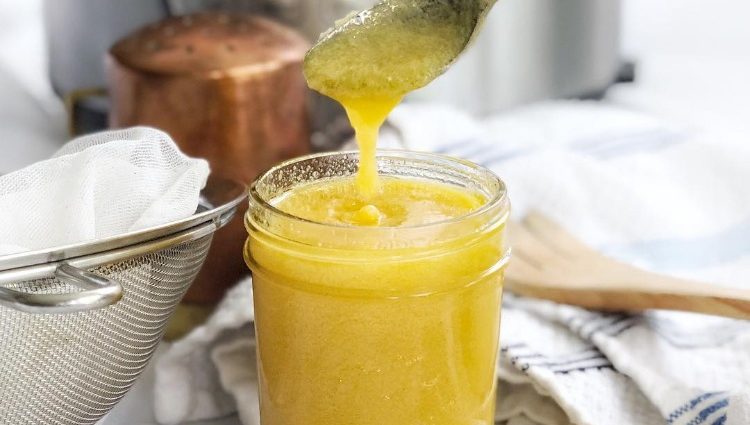Ghee, a form of clarified butter that originated in ancient India, has been a staple in South Asian and Middle Eastern cuisines for centuries. Characterized by its rich nutty flavor and high smoke point, ghee is made by simmering butter to separate the liquid fats and milk solids. In recent years, ghee has gained significant attention in the health and wellness community, especially among those looking to improve their diet and potentially support weight loss goals.
With its unique nutritional profile, including a high concentration of healthy fats, vitamins A, E, and D, and butyric acid, ghee is often considered a superfood. However, as with any dietary addition, it’s important to understand how ghee fits into a balanced weight loss plan.
This article will explore the roles and benefits of incorporating ghee into your diet and whether it can truly help with weight loss.
Benefits of Ghee for Weight Loss: Nutritional Value of Ghee
Ghee, also known as clarified butter, is a staple in traditional Indian cooking and has gained popularity worldwide for its health benefits. Rich in vitamins A, D, E, and K, ghee provides a concentrated source of fat-soluble vitamins essential for various bodily functions including immune system support and bone health. Unlike regular butter, ghee is free of lactose and casein, making it a better option for those with dairy sensitivities. Ghee contains butyric acid, a short-chain fatty acid that promotes gut health and reduces inflammation. Additionally, the medium-chain triglycerides (MCTs) found in ghee are processed differently by the body, leading to potential weight loss benefits as they are quickly used for energy rather than stored as fat.
Role of Ghee in a Balanced Diet
Incorporating ghee into a balanced diet can support weight loss when consumed in moderation. The key is its satiating power; ghee can make you feel full for longer periods, reducing the need to snack between meals. Its rich flavor also means that a small amount can enhance the taste of your dishes, making it easier to stick to a healthy eating plan without feeling deprived. However, like all fats, ghee is calorie-dense, so portion control is crucial. Using ghee as a replacement for other unhealthy fats in the diet can help reduce overall calorie intake while still providing essential nutrients.
Ghee vs. Other Cooking Oils:
- Comparison of Ghee with Vegetable Oils
When comparing ghee to vegetable oils, several factors stand out. Most vegetable oils contain high levels of polyunsaturated fats, which can be unstable at high temperatures and potentially form unhealthy compounds when heated. Ghee, on the other hand, is predominantly made up of saturated fats, making it more stable and less likely to oxidize during cooking. This stability makes ghee a healthier choice for high-heat cooking methods like frying and sautéing. Additionally, ghee lacks the artificial preservatives and chemicals found in many processed oils.
- Impact on Weight Loss
Regarding weight loss, the type of fat you consume matters. The medium-chain triglycerides in ghee can boost metabolism slightly, promoting weight loss. Ghee’s ability to enhance the flavor of food means that smaller amounts may be used, potentially reducing overall calorie intake.
Comparatively, some vegetable oils can contribute to inflammation in the body, which can hinder weight loss efforts. However, as with any fat, the key to ghee is moderation. Too much of any fat, including ghee, can lead to weight gain, so it’s important to use it strategically within a calorie-controlled diet.
Incorporating Ghee into Weight Loss Plans:
When considering adding ghee to a weight loss diet, understanding the best ways to integrate it can make all the difference. Ghee, with its rich flavor and nutritional profile, offers a versatile option for enhancing diet plans aimed at losing weight. Below, find guidance on daily consumption, flavorful recipes, and ghee’s role as a source of healthy fats.
Recommended Daily Consumption
The key to incorporating ghee into a diet for weight loss is moderation due to its high calorie and fat content. Nutrition experts generally recommend limiting ghee intake to about 1-2 teaspoons daily. This amount allows you to enjoy the benefits of ghee, including its rich taste and healthful fats, without excessive calorie intake. Always consider your overall dietary fat consumption and adjust ghee quantities accordingly to maintain a balanced diet.
Recipe Ideas with Ghee
Ghee is highly adaptable and can be incorporated into a myriad of recipes that align with weight loss goals. Here are a few ideas:
- Sautéed Vegetables: Use a teaspoon of ghee to sauté vegetables. The ghee will add a nutty flavor that enhances the natural taste of the vegetables.
- Healthy Spread: Substitute butter with ghee on whole-grain toast for a healthier alternative.
- Baking: Ghee can replace butter in most baking recipes, offering a rich flavor while keeping your treats more weight-loss friendly.
These ideas show that ghee can be an integral part of delicious, health-conscious meals.
Ghee as a Source of Healthy Fats
Ghee is rich in medium-chain triglycerides (MCTs) and butyrate, making it an excellent source of healthy fats. MCTs can aid in metabolism and weight loss because they are quickly metabolized by the body and less likely to be stored as fat. Butyrate, a type of fatty acid found in ghee, has been shown to support digestive health and reduce inflammation.
Potential Downsides of Ghee for Weight Loss:
While ghee has many qualities that can support weight loss, there are potential downsides to consider before making it a staple in your diet.
High-Calorie Content
Ghee is calorie-dense, with a single tablespoon containing around 120 calories. When trying to lose weight, monitoring calorie intake is crucial, and high-calorie foods can quickly lead to exceeding daily caloric needs if not consumed in moderation.
Moderation and Portion Control
Effective weight management with ghee hinges on moderation and careful portion control. Due to its high fat and calorie content, it’s easy to overconsume ghee, potentially offsetting weight loss efforts. Integrating ghee into your diet requires conscientious consumption—measuring servings can help avoid unintentional overeating and ensure that ghee is added to your diet in healthful amounts.
By being mindful of the potential downsides and practicing moderation, ghee can be part of a balanced diet that supports weight loss and overall health.
Research Studies on Ghee and Weight Loss

The link between ghee and weight loss has been the subject of various research studies. These investigations aim to understand how this form of clarified butter, which has been a staple in Indian cuisine for centuries, impacts the body’s metabolic processes and weight management efforts.
Scientific Findings
Recent scientific studies shed some light on ghee’s role in weight management. One notable research published in the “Journal of Nutritional Biochemistry” highlights that ghee is rich in conjugated linoleic acid (CLA), a type of fatty acid known to promote fat loss in obese mice. The study posits that CLA enhances the body’s ability to burn fat and assists in the reduction of body fat percentage when consumed in moderation.
Another study, focusing on the metabolic effects of ghee versus soybean oil in a controlled group of adults, found that participants consuming ghee had a slightly higher increase in HDL cholesterol (considered “good” cholesterol) and a reduction in waist circumference compared to those consuming soybean oil. This research suggests that ghee could play a role in improving body composition and supporting cardiovascular health, indirectly contributing to weight loss and maintenance.
Expert Opinions
Nutritionists and health experts have varying opinions on ghee’s efficacy in weight loss. The majority agree that while ghee contains healthy fats that can support weight management and provide a wealth of nutritional benefits, it should be consumed in moderation. They underscore the importance of a balanced diet where ghee complements other nutrient-dense foods rather than being seen as a solo weight loss solution.
Experts also highlight the significance of considering individual health conditions and dietary needs. For some, incorporating ghee might offer excellent benefits in controlling weight and improving heart health. However, for others, especially individuals with a predisposition to cholesterol-related issues, careful consumption is advised.
Conclusion
In conclusion, ghee can be a beneficial addition to a weight loss diet when used in moderation as part of a balanced and healthy lifestyle. Scientific studies back the notion that ghee, with its unique fatty acid profile, including CLA, might aid in fat reduction and improve body composition. However, it is not a magic bullet for weight loss and should be consumed within the parameters of an individual’s dietary needs and health goals.
As with any dietary change, it is recommended to consult with a healthcare provider or a nutritionist to tailor your diet to your specific health requirements, ensuring that ghee serves as an ally in your weight loss journey rather than a hindrance.
FAQs about Ghee and Weight Loss:
Ghee, a form of clarified butter, has been a staple in culinary traditions around the world, particularly in South Asian and Middle Eastern cuisines. Its rich flavor and high smoke point make it a versatile ingredient in cooking. Beyond its culinary appeal, ghee is also touted for its health benefits, including potential weight loss. Here, we address some frequently asked questions about ghee’s role in a weight loss journey.
Is Ghee High in Calories?
Yes, ghee is high in calories since it is a form of fat. One tablespoon of ghee contains approximately 120 calories. However, the concept of calorie quality is important; ghee provides a rich source of healthy fats that can support weight management when consumed in moderation.
Can Ghee Help in Reducing Belly Fat?
There is no direct evidence to suggest that ghee specifically targets belly fat. However, diets rich in healthy fats, such as those found in ghee, can play a role in overall weight management by promoting satiety and reducing the likelihood of overeating.
How Should Ghee be Incorporated Into a Weight-Loss Diet?
- Use ghee in place of other cooking oils and butter for sautéing and other stovetop cooking to add flavor and nutrition.
- Limit servings to control calorie intake, considering 1-2 teaspoons per day as a general guideline.
- Pair ghee with a balanced diet rich in vegetables, fruits, whole grains, and lean proteins to maximize health benefits and support weight loss.
Additional Resources:
When it comes to understanding the effects of ghee on weight loss and overall health, information is your greatest ally. Numerous trusted sources can provide insight and guidance on how to incorporate ghee into a balanced diet effectively. Here are some additional resources to help deepen your understanding:
- Nutrition Journals and Academic Papers: These can offer in-depth studies and research findings on the health impacts of ghee, including its role in metabolism and weight management.
- Dietary Guidelines: Government and health organizations publish dietary guidelines that provide recommendations on the intake of fats, including healthy fats like ghee, about maintaining a healthy weight.
- Cookbooks and Recipe Blogs: For practical applications, look for cookbooks and recipe blogs that focus on healthy eating. Many of these resources offer creative ways to incorporate ghee into your diet without compromising your weight loss goals.
- Nutritionists and Dietitians: Consulting with a professional can provide personalized advice based on your specific health requirements and objectives. They can guide you on how to balance your fat intake, including ghee, to support your weight loss journey.
Empowering yourself with knowledge is key to making informed decisions about your diet. By exploring these resources, you can gain a broader perspective on how ghee fits into a weight loss plan and overall healthy lifestyle.
